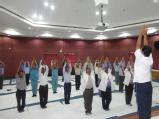
Gandhinagar, Mangalore, India - 575003.
Verified
2
Details verified of Naganagouda H.✕
 Identity
Identity
 Education
Education
Know how UrbanPro verifies Tutor details
Identity is verified based on matching the details uploaded by the Tutor with government databases.







+4 more
Kannada Mother Tongue (Native)
English Proficient
Hindi Proficient
![]() Mangalore University 2003
Mangalore University 2003
Master of Science (M.Sc.)
Gandhinagar, Mangalore, India - 575003
![]() ID Verified
ID Verified
![]() Education Verified
Education Verified
![]() Phone Verified
Phone Verified
![]() Email Verified
Email Verified
Report this Profile
Is this listing inaccurate or duplicate? Any other problem?
Please tell us about the problem and we will fix it.
Class Location
![]() Online (video chat via skype, google hangout etc)
Online (video chat via skype, google hangout etc)
![]() Student's Home
Student's Home
![]() Tutor's Home
Tutor's Home
Yoga certification given
No
Yoga purpose catered to
Yoga Philosophy/ Yoga Sutra Studies, Increased energy, Stress Relief, Improve immunity, Weight loss, General Fitness, Better flexibility, Remedy for Body pains
Age group catered to
14- 21 years old, 5- 13 years-old, 22- 50 years old, Above 50 years
Styles of Yoga
Patanjali Yoga, Yoga Meditation, Hatha Yoga, Raja Yoga, Ashtanga Yoga, Pregnancy/Prenatal Yoga
Class Location
![]() Online (video chat via skype, google hangout etc)
Online (video chat via skype, google hangout etc)
![]() Student's Home
Student's Home
![]() Tutor's Home
Tutor's Home
Years of Experience in Meditation classes
15
Teaching Experience in detail in Meditation classes
Meditation is the great opportunity to de – stress the impacts of the stressful situations of the city life. The course provides the understanding of the simple meditation techniques which are helpful to develop the sound mental health, improve the concentration and memory. The practice of meditation is an antidote for the stress and its harmful effects on the mind and body. The regular practice of meditation will harness the health and harmony in the life by preventing psychosomatic diseases. This course helps to reconnect to your inner spirit and rejuvenates the inner energy. Practice of the following Yogic Practices with brief theoretical knowledge about their Importance of the name, the technique, salient points, Precautions to be taken and Advantages of each of the following Yogic practices. 1. Meditative and Relaxative Asanas 2. Pranayama 3.Yoga Nidra and Relaxation techniques 4.Meditation techniques. 5. Mantra Chanting
Class Location
![]() Online (video chat via skype, google hangout etc)
Online (video chat via skype, google hangout etc)
![]() Student's Home
Student's Home
![]() Tutor's Home
Tutor's Home
Years of Experience in Weight Loss Trainers
18
Teaching Experience in detail in Weight Loss Trainers
The modern day lifestyle associated with too much of stress and sedentary and semi sedentary activities has been one of the fundamental cause of the excess body weight gain which is risk factor for the onset obesity and many other lifestyle disorders . The principles and practices of Yoga are very helpful to prevent the obesity and maintain the ideal body weight in order to enjoy the greater productivity and happiness in the life. The practice of Yoga inculcates the discipline of the food and lifestyle which is very useful to rectify the mistakes in the eating habits.
5 out of 5 5 reviews
Shweta Kulkarni
"A passionate teacher with scientific blend of teaching approach The classes were well planned and tuned to improve my focus Teachings of pranayama was great help in the preparation of medication "
Punitkumar B n
Yoga Preferred Yoga Style:Ashtanga Yoga,Hatha Yoga Age group of student:22- 50 years old
"Dr Nagesh is a deeply experienced and extensively qualified yoga practitioner who embodies and imparts the highest standards and ethics of training to his students."
Punitkumar B n
"Nagesh Sir, such as his teaching style, expertise, specific qualities in field of yoga that's really great experience. "
Shweta Kulkarni
Yoga Preferred Yoga Style:Ashtanga Yoga,Bikram Yoga Age group of student:22- 50 years old
"Dr Nagesh is deeply experienced and extensively qualified yoga practitioner who embodies and imparts the highest standards and ethics of training to his students. "
1. What style of Yoga do you teach?
Patanjali Yoga, Yoga Meditation, Hatha Yoga and others
2. Which of the age groups do you cater to?
14- 21 years old, 5- 13 years-old, 22- 50 years old and others
3. Which classes do you teach?
I teach Meditation, Stress Management Training, Weight Loss and Yoga Classes.
4. Do you provide a demo class?
No, I don't provide a demo class.
5. How many years of experience do you have?
I have been teaching for less than a year.
Answered on 09/12/2024 Learn Spirituality and Mind/Meditation
The best meditation technique depends on your goals, personal preferences, and experience level. Here’s an overview of some of the most effective meditation techniques, categorized based on their focus:
Focus: Awareness of the present moment without judgment.
Technique: Sit comfortably, focus on your breath, body sensations, or surroundings, and gently return your attention whenever the mind wanders.
Benefits: Reduces stress, improves concentration, and fosters emotional regulation.
Ideal for: Beginners and those seeking mental clarity and relaxation.
Focus: Cultivating compassion, love, and kindness.
Technique: Silently repeat phrases like "May I be happy, may I be healthy" for yourself, and extend these wishes to others, including loved ones, acquaintances, and even difficult individuals.
Benefits: Enhances empathy, reduces negative emotions, and fosters forgiveness.
Ideal for: Improving relationships and emotional well-being.
Focus: Mental imagery to relax and achieve specific goals.
Technique: Follow verbal instructions (live or recorded) to visualize peaceful scenes, desired outcomes, or healing processes.
Benefits: Boosts creativity, reduces anxiety, and can help with goal-setting.
Ideal for: Beginners and those who prefer structured guidance.
Focus: Concentration on the breath.
Technique: Observe the natural rhythm of your inhalations and exhalations without trying to control them. Use counting if necessary to anchor your focus.
Benefits: Calms the mind, improves focus, and anchors you in the present moment.
Ideal for: Beginners and those seeking a simple and effective method.
Focus: Insight into the true nature of reality.
Technique: Observe sensations, thoughts, and emotions with detachment and without reacting, often practiced intensively during retreats.
Benefits: Develops self-awareness, emotional regulation, and equanimity.
Ideal for: Advanced practitioners seeking deeper understanding.
Focus: Balancing the energy centers in the body.
Technique: Concentrate on specific chakras (energy centers) using visualization, mantras, or breathing techniques to align and energize them.
Benefits: Promotes emotional and energetic balance.
Ideal for: Those interested in energy work and spiritual growth.
Focus: Deep relaxation and conscious awareness.
Technique: Lie down and follow guided instructions to enter a state between wakefulness and sleep while remaining aware.
Benefits: Reduces stress, improves sleep, and rejuvenates the mind and body.
Ideal for: Stress management and profound relaxation.
Choosing the Best Technique
Consider the following:
Your Goals: Stress reduction, emotional healing, spiritual growth, or focus.
Your Personality: Structured vs. flexible, still vs. active.
Your Time: Some techniques require more commitment (e.g., Vipassana retreats), while others are quick (e.g., breath awareness).
Experiment with different methods to find the one that resonates most with you. Each technique has its own beauty and benefits, and the "best" one is the one that supports your journey and needs.
Answered on 05/12/2024 Learn Spirituality and Mind
The relationship between science and spirituality is complex and multifaceted, as they address different but sometimes overlapping aspects of human experience. Here’s an exploration of their relationship:
Together, they offer complementary insights into reality—science exploring the "how" of existence and spirituality exploring the "why."
Both science and spirituality arise from a sense of wonder and curiosity about the universe:
In this sense, both approaches can inspire awe and a sense of the profound interconnectedness of all things.
There are areas where science and spirituality intersect, leading to mutual enrichment:
In recent years, there has been a growing interest in integrating science and spirituality:
Both science and spirituality grapple with fundamental questions about existence:
While their answers may differ, both contribute to humanity's quest for understanding.
Some thinkers argue that science and spirituality are not separate but two ways of exploring the same reality. In this view:
Answered on 05/12/2024 Learn Spirituality and Mind
Yoga is often viewed as a holistic practice that integrates physical, mental, and spiritual well-being. The spiritual aspects of yoga are deeply rooted in ancient philosophical traditions, particularly in Hinduism, Buddhism, and Jainism. These aspects focus on self-awareness, personal growth, and the connection to something greater than oneself. Here are some key spiritual elements of yoga:
Overall, the spiritual dimensions of yoga are about seeking a deeper connection to oneself, others, and the Divine, transcending the ego, and experiencing a state of unity, peace, and enlightenment.
Answered on 05/12/2024 Learn Spirituality and Mind
Answered on 10/12/2015 Learn Ashtanga Yoga Classes
Class Location
![]() Online (video chat via skype, google hangout etc)
Online (video chat via skype, google hangout etc)
![]() Student's Home
Student's Home
![]() Tutor's Home
Tutor's Home
Yoga certification given
No
Yoga purpose catered to
Yoga Philosophy/ Yoga Sutra Studies, Increased energy, Stress Relief, Improve immunity, Weight loss, General Fitness, Better flexibility, Remedy for Body pains
Age group catered to
14- 21 years old, 5- 13 years-old, 22- 50 years old, Above 50 years
Styles of Yoga
Patanjali Yoga, Yoga Meditation, Hatha Yoga, Raja Yoga, Ashtanga Yoga, Pregnancy/Prenatal Yoga
Class Location
![]() Online (video chat via skype, google hangout etc)
Online (video chat via skype, google hangout etc)
![]() Student's Home
Student's Home
![]() Tutor's Home
Tutor's Home
Years of Experience in Meditation classes
15
Teaching Experience in detail in Meditation classes
Meditation is the great opportunity to de – stress the impacts of the stressful situations of the city life. The course provides the understanding of the simple meditation techniques which are helpful to develop the sound mental health, improve the concentration and memory. The practice of meditation is an antidote for the stress and its harmful effects on the mind and body. The regular practice of meditation will harness the health and harmony in the life by preventing psychosomatic diseases. This course helps to reconnect to your inner spirit and rejuvenates the inner energy. Practice of the following Yogic Practices with brief theoretical knowledge about their Importance of the name, the technique, salient points, Precautions to be taken and Advantages of each of the following Yogic practices. 1. Meditative and Relaxative Asanas 2. Pranayama 3.Yoga Nidra and Relaxation techniques 4.Meditation techniques. 5. Mantra Chanting
Class Location
![]() Online (video chat via skype, google hangout etc)
Online (video chat via skype, google hangout etc)
![]() Student's Home
Student's Home
![]() Tutor's Home
Tutor's Home
Years of Experience in Weight Loss Trainers
18
Teaching Experience in detail in Weight Loss Trainers
The modern day lifestyle associated with too much of stress and sedentary and semi sedentary activities has been one of the fundamental cause of the excess body weight gain which is risk factor for the onset obesity and many other lifestyle disorders . The principles and practices of Yoga are very helpful to prevent the obesity and maintain the ideal body weight in order to enjoy the greater productivity and happiness in the life. The practice of Yoga inculcates the discipline of the food and lifestyle which is very useful to rectify the mistakes in the eating habits.
Answered on 09/12/2024 Learn Spirituality and Mind/Meditation
The best meditation technique depends on your goals, personal preferences, and experience level. Here’s an overview of some of the most effective meditation techniques, categorized based on their focus:
Focus: Awareness of the present moment without judgment.
Technique: Sit comfortably, focus on your breath, body sensations, or surroundings, and gently return your attention whenever the mind wanders.
Benefits: Reduces stress, improves concentration, and fosters emotional regulation.
Ideal for: Beginners and those seeking mental clarity and relaxation.
Focus: Cultivating compassion, love, and kindness.
Technique: Silently repeat phrases like "May I be happy, may I be healthy" for yourself, and extend these wishes to others, including loved ones, acquaintances, and even difficult individuals.
Benefits: Enhances empathy, reduces negative emotions, and fosters forgiveness.
Ideal for: Improving relationships and emotional well-being.
Focus: Mental imagery to relax and achieve specific goals.
Technique: Follow verbal instructions (live or recorded) to visualize peaceful scenes, desired outcomes, or healing processes.
Benefits: Boosts creativity, reduces anxiety, and can help with goal-setting.
Ideal for: Beginners and those who prefer structured guidance.
Focus: Concentration on the breath.
Technique: Observe the natural rhythm of your inhalations and exhalations without trying to control them. Use counting if necessary to anchor your focus.
Benefits: Calms the mind, improves focus, and anchors you in the present moment.
Ideal for: Beginners and those seeking a simple and effective method.
Focus: Insight into the true nature of reality.
Technique: Observe sensations, thoughts, and emotions with detachment and without reacting, often practiced intensively during retreats.
Benefits: Develops self-awareness, emotional regulation, and equanimity.
Ideal for: Advanced practitioners seeking deeper understanding.
Focus: Balancing the energy centers in the body.
Technique: Concentrate on specific chakras (energy centers) using visualization, mantras, or breathing techniques to align and energize them.
Benefits: Promotes emotional and energetic balance.
Ideal for: Those interested in energy work and spiritual growth.
Focus: Deep relaxation and conscious awareness.
Technique: Lie down and follow guided instructions to enter a state between wakefulness and sleep while remaining aware.
Benefits: Reduces stress, improves sleep, and rejuvenates the mind and body.
Ideal for: Stress management and profound relaxation.
Choosing the Best Technique
Consider the following:
Your Goals: Stress reduction, emotional healing, spiritual growth, or focus.
Your Personality: Structured vs. flexible, still vs. active.
Your Time: Some techniques require more commitment (e.g., Vipassana retreats), while others are quick (e.g., breath awareness).
Experiment with different methods to find the one that resonates most with you. Each technique has its own beauty and benefits, and the "best" one is the one that supports your journey and needs.
Answered on 05/12/2024 Learn Spirituality and Mind
The relationship between science and spirituality is complex and multifaceted, as they address different but sometimes overlapping aspects of human experience. Here’s an exploration of their relationship:
Together, they offer complementary insights into reality—science exploring the "how" of existence and spirituality exploring the "why."
Both science and spirituality arise from a sense of wonder and curiosity about the universe:
In this sense, both approaches can inspire awe and a sense of the profound interconnectedness of all things.
There are areas where science and spirituality intersect, leading to mutual enrichment:
In recent years, there has been a growing interest in integrating science and spirituality:
Both science and spirituality grapple with fundamental questions about existence:
While their answers may differ, both contribute to humanity's quest for understanding.
Some thinkers argue that science and spirituality are not separate but two ways of exploring the same reality. In this view:
Answered on 05/12/2024 Learn Spirituality and Mind
Yoga is often viewed as a holistic practice that integrates physical, mental, and spiritual well-being. The spiritual aspects of yoga are deeply rooted in ancient philosophical traditions, particularly in Hinduism, Buddhism, and Jainism. These aspects focus on self-awareness, personal growth, and the connection to something greater than oneself. Here are some key spiritual elements of yoga:
Overall, the spiritual dimensions of yoga are about seeking a deeper connection to oneself, others, and the Divine, transcending the ego, and experiencing a state of unity, peace, and enlightenment.
Answered on 05/12/2024 Learn Spirituality and Mind
Answered on 10/12/2015 Learn Ashtanga Yoga Classes

Share this Profile
Reply to 's review
Enter your reply*
Your reply has been successfully submitted.
Certified
The Certified badge indicates that the Tutor has received good amount of positive feedback from Students.